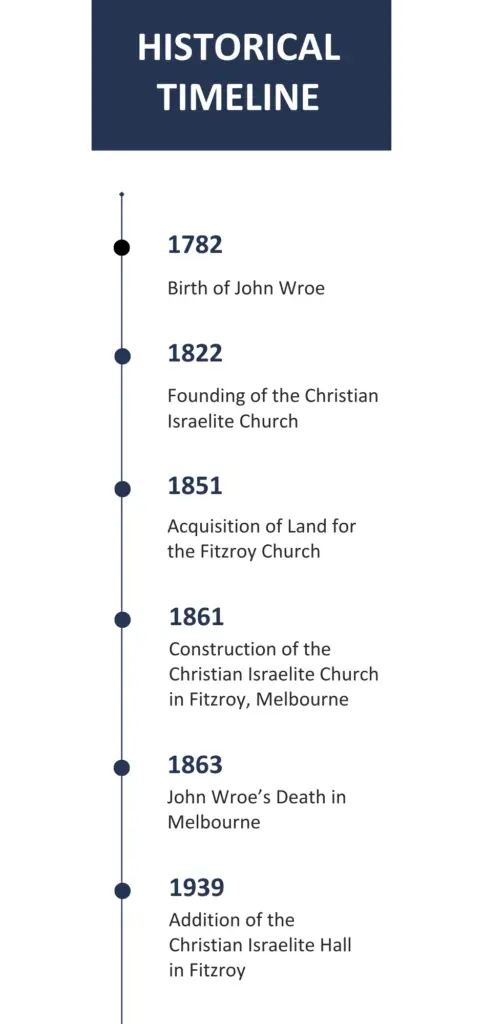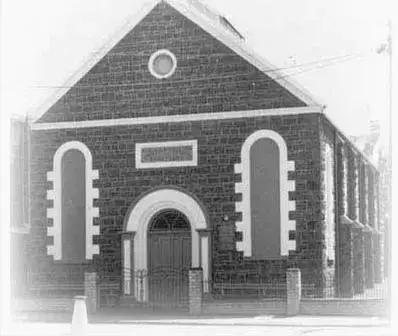History
History of the Fitzroy Christian Israelite Church Building
The Christian Israelite Church Fitzroy building was constructed in 1861. The contractor for the project was Thomas W. Hannaford, who was one of the Trustees of the Church. The land was acquired in 1851, by William Kirk and John Cartright on behalf of the Church. A small wooden church was initially erected on the site, which continued to be used by members even after the construction of the new bluestone building had begun. Services were held until the exterior of the new building was completed.
Once the new Church building was finished, the wooden structure inside was dismantled and carried out through the front doors. In 1939, the Christian Israelite Hall was added on adjacent land, which had previously been used to hold horses and carriages while members attended Church services.
When the land was first acquired, the address was 193 Fitzroy St (corner of Little Hanover Street), part of Crown Portion Forty-Eight in Fitzroy, within the parish of Jika Jika, county of Bourke. Over the years, the borders of Fitzroy were altered, and for a time, the suburb’s name was changed from Fitzroy to Collingwood, before reverting to Fitzroy. This happened several times as the authorities managed population growth, which has led to the misconception that there were two churches in Melbourne. However, there has only ever been one church, consistently located at 193 Fitzroy Street, whether referred to as Fitzroy or Collingwood.
Additional Resources on the History of the Christian Israelite Church in Fitzroy:

The Role of Prophets and Messengers in the Church’s Founding
Throughout history, God has used prophets to deliver messages to His people, and this tradition continued with John Wroe, the founder of the Christian Israelite Church. Wroe was called by God to begin the work of gathering the lost tribes of Israel and establishing the New Covenant in preparation for the return of Jesus Christ, the Messiah. His mission was rooted in the Biblical promises of God’s covenant with Israel and the prophecy of a future gathering of the lost tribes (Isaiah 11:11-12, Jeremiah 31:31).
John Wroe: A Prophet’s Early Life and Calling
John Wroe was born in 1782 in Bowling, Yorkshire. His early life was marked by hardship and he experienced several near-fatal illnesses in 1819. Wroe began to turn to God, convicted of the difference between serving God and serving the devil. John began to have many divine visions and dreams describing God’s calling on his life. Although John was a reluctant messenger who described himself as ‘wrestling with God’, the visions drew him closer to the Lord who began to reveal to him what God’s intentions were. His calling was clear: “Go forth into all nations…and declare the last covenant that shall be made with man.”
1822: The Birth of the Christian Israelite Church
In 1822, John Wroe founded the Christian Israelite Church, having received numerous divine communications explaining Biblical teachings and shaping the Church’s structure. These revelations included prophecies about future events, especially those concerning the end of the world. Wroe was an instrument for affirming the New Covenant with Israel, as foretold in Jeremiah 31:31 and Hebrews 8:8, and through divine inspiration established the structure and administration of the Church.
Wroe’s Legacy and the Church’s Growth
John Wroe’s mission led to the development of Christian Israelite communities across many nations. His travels, particularly to Australia, expanded the Church’s reach, with congregations forming in cities such as Hobart, Launceston, Adelaide, Melbourne, and Sydney. Wroe passed away in 1863 in Melbourne.
A Humble Prophet
Although John Wroe was instrumental in the Church’s foundation, the focus of Christian Israelites remains firmly on God and His message, not the messenger. Wroe is remembered as a humble, ordinary man through whom the message of an extraordinary God was given. In line with this belief, following his death, John Wroe’s grave was left unmarked, reflecting his role as a servant of God rather than a figure of personal veneration.
The Role of the Prophet Today
Wroe’s teachings continue to shape the Church, and his records contribute to the members’ understanding of the Bible. His legacy lives on through the ongoing mission of the Christian Israelite Church, which remains faithful to the teachings and structure laid out through divine inspiration. The Church continues to focus on God’s covenant and the gathering of Israel, in readiness for the return of Jesus Christ.

Connect With Us
Email Enquiry
Send us your questions or share your thoughts via email. We’re here to help and respond to your inquiries promptly.
Request a Resource
Looking for specific information or materials? Request resources directly, and we’ll ensure you receive what you need to enhance your understanding and connection.
Connect by phone
Prefer a personal touch? Give us a call. Our friendly team are available to speak with you and answer any questions.
visit us
We welcome visitors at 11.30am every Sunday. We look forwarding to meeting you.